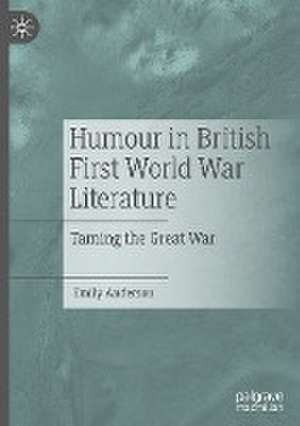Humour in British First World War Literature: Taming the Great War
Autor Emily Andersonen Limba Engleză Hardback – 12 sep 2023
Preț: 628.59 lei
Preț vechi: 785.75 lei
-20% Nou
Puncte Express: 943
Preț estimativ în valută:
120.28€ • 125.90$ • 100.11£
120.28€ • 125.90$ • 100.11£
Carte disponibilă
Livrare economică 10-24 martie
Livrare express 21-27 februarie pentru 29.97 lei
Preluare comenzi: 021 569.72.76
Specificații
ISBN-13: 9783031340505
ISBN-10: 3031340507
Pagini: 235
Ilustrații: IX, 235 p. 3 illus.
Dimensiuni: 148 x 210 x 22 mm
Greutate: 0.45 kg
Ediția:1st ed. 2023
Editura: Springer International Publishing
Colecția Palgrave Macmillan
Locul publicării:Cham, Switzerland
ISBN-10: 3031340507
Pagini: 235
Ilustrații: IX, 235 p. 3 illus.
Dimensiuni: 148 x 210 x 22 mm
Greutate: 0.45 kg
Ediția:1st ed. 2023
Editura: Springer International Publishing
Colecția Palgrave Macmillan
Locul publicării:Cham, Switzerland
Cuprins
1. Introduction: ‘[A]s in most war fiction, humour predominates’.- 2. Humour and Britishness During the Great War: ‘If a man brings us a joke, we require to be satisfied of its durability’.- 3. The Domestication of Death: ‘There are lots of jokes’.- 4. Class and Social Structure: ‘It is not taken seriously’.- 5. War and the Depiction of Gender: ‘Let us hope for the best and assume that he is dead’.- 6. The War and the Domestic Sphere: ‘That perpetual sense of the ridiculous’.- 7. Parody and Pop Culture in Trench Newspapers: ‘Let’s whistle ragtime ditties while we’re bashing out Hun brains’.- 8. Short Fiction and Service-Author Heroes: ‘You can’t expect glory and accuracy for a half-penny’.- 9. Conclusion.
Notă biografică
Emily Anderson is a researcher, writer, and podcaster. Her research interests are in literary humour and unfinished projects.
Textul de pe ultima copertă
This book explores how humorous depictions of the Great War helped to familiarise, domesticate and tame the conflict. In contrast to the well-known First World War literature that focuses on extraordinary emotional disruption and the extremes of war, this study shows other writers used humour to create a gentle, mild amusement, drawing on familiar, popular genres and forms used before 1914. Emily Anderson argues that this humorous literature helped to transform the war into quotidian experience. Based on little-known primary material uncovered through detailed archival research, the book focuses on works that, while written by celebrated authors, tend not to be placed in the canon of Great War literature. Each chapter examines key examples of literary texts, ranging from short stories and poetry, to theatre and periodicals. In doing so, the book investigates the complex political and social significance of this tame style of humour.
Emily Anderson is Associate Lecturer in the School of English Literature, Language and Linguistics at Newcastle University, UK. Her research interests are in humour and whimsy in British literature, focusing on the late nineteenth and early twentieth centuries.
Caracteristici
Explores how humour was used in Great War literature to tame the experience of war Presents a corpus of literary texts usually overlooked by scholars and not included in the canon of WWI literature Examines the political and social significance of humorous depictions of the war
